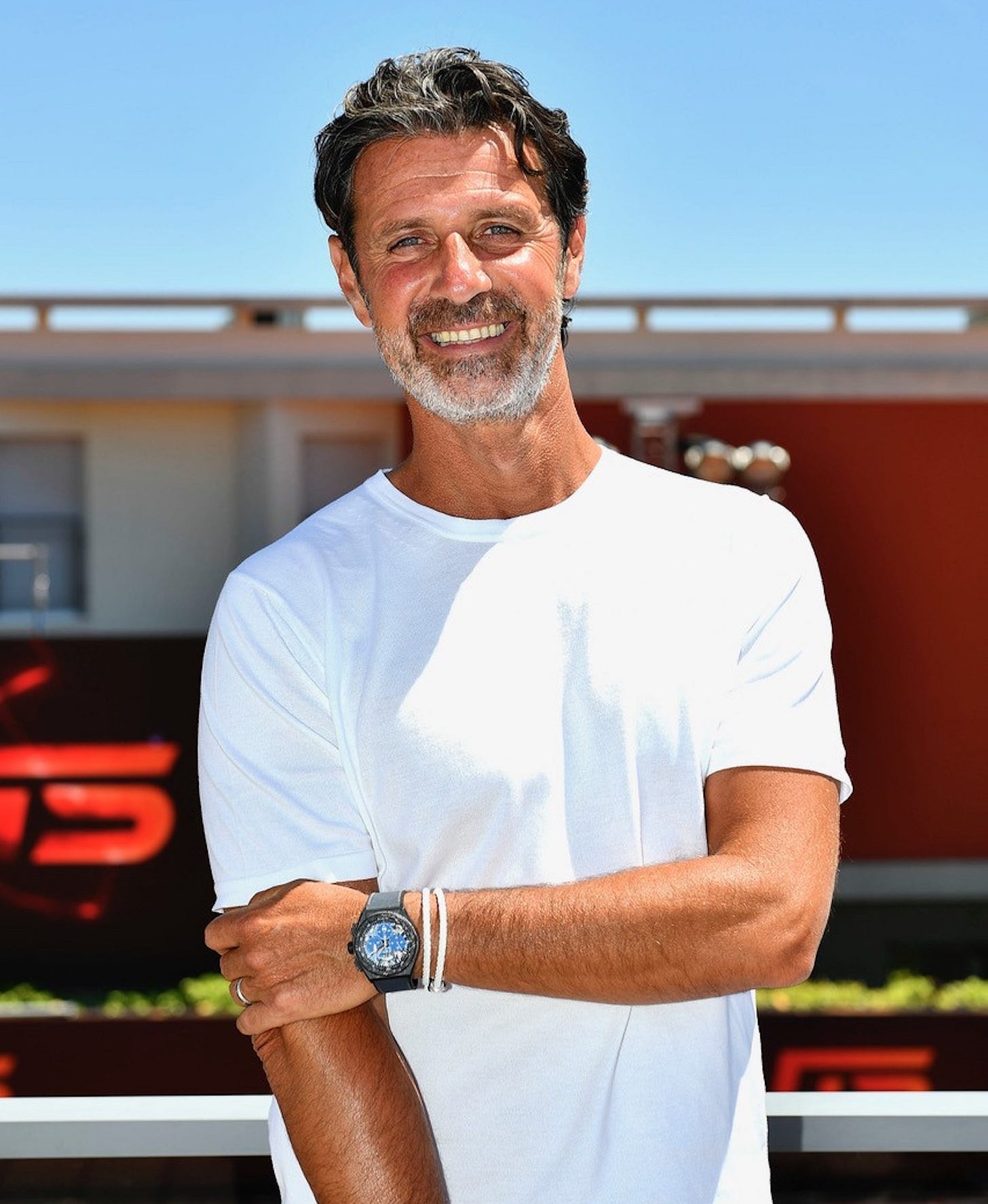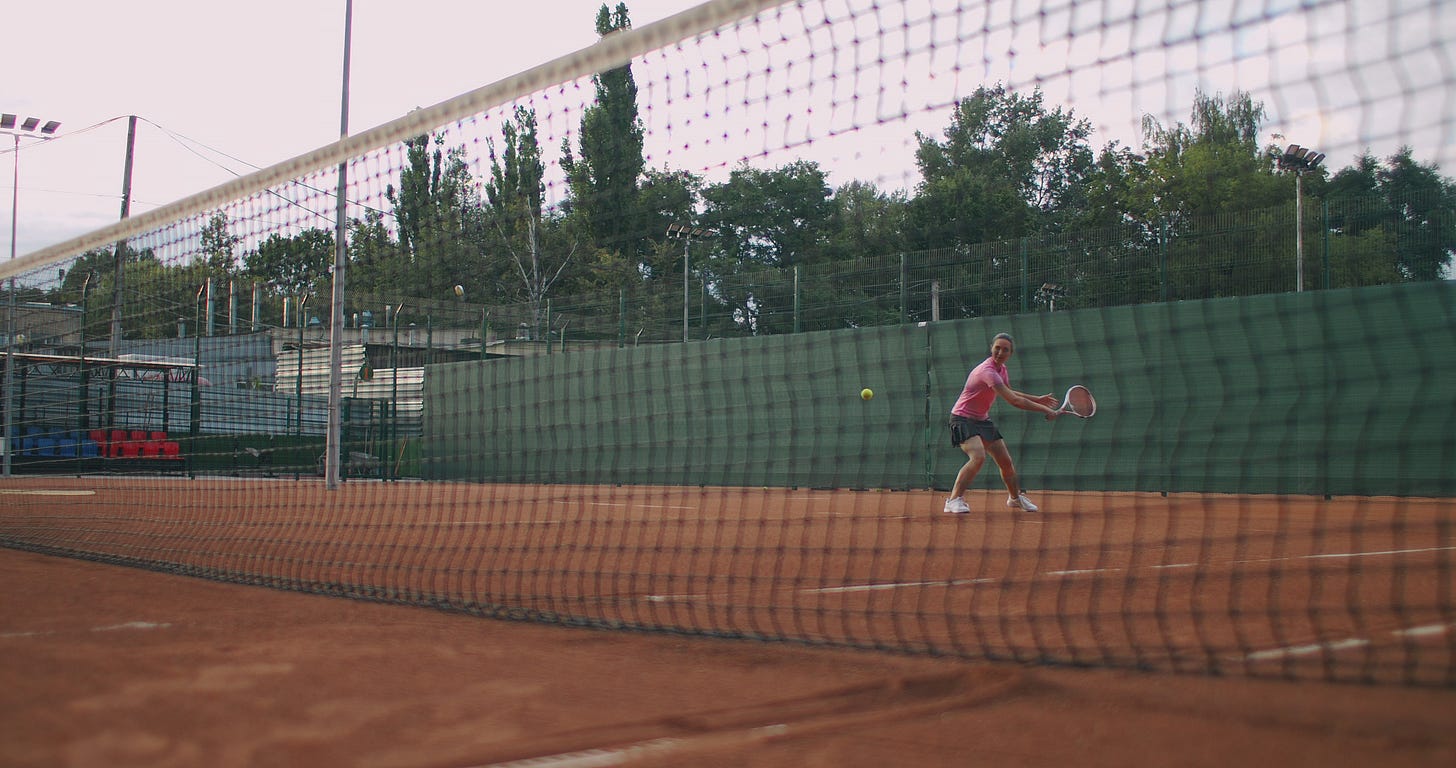How to Win the Inner Game
Tennis icon Patrick Mouratoglou joins Rainn on the pod and shares an exclusive excerpt from his new book, Champion Mindset
Greetings, Soul Champs!
This week on the Soul Boom podcast, Rainn sits down with legendary tennis coach Patrick Mouratoglou.
Patrick is the man behind Serena Williams’ comeback, Coco Gauff’s rise, and more Grand Slam titles than we have fingers. But what makes Patrick truly fascinating to us here at Soul Boom isn’t his trophy count—it’s his playbook for the inner game.
You see, Patrick’s work isn’t just about training the body—it’s about transforming the mind. And not in a vague, self-help-y, “visualize your dreams and manifest a yacht” kind of way. We’re talking about deep inner work: navigating self-doubt, building self-esteem from scratch, and finding the one thing that sets your soul on fire. (Also, occasionally whacking tennis balls against a garden wall like your life depends on it.)
Which brings us to a little gift for you today: an exclusive excerpt from his upcoming book, Champion Mindset. It’s both a how-to guide and personal reflection on his own journey—one that involves anxiety, isolation, and the unexpected spiritual magic of hitting a tennis ball against a garden wall. No spoilers, but it might just be the pep talk your inner child (and maybe your adult self) needs. It’s soulful, vulnerable, and energizing—even if the only sport you’ve played lately is late-night doomscrolling.
What Patrick makes clear is that self-esteem isn’t a trait we’re born with, nor a switch we can flip—but a state we can nurture through consistent inner work. In this excerpt, Patrick reminds us that our greatest victories always begin on the inside.
Cheering you on—always,
The Soul Boom Team
Success Starts with Self-Esteem
by Patrick Mouratoglou (excerpted from Champion Mindset)
The Crystal Ball of Self-Esteem
Self-esteem, properly defined, is how we value ourselves. It is also a self-fulfilling prophecy. When we believe we are bad at something, we avoid it; we don’t push ourselves, and, critically, we give up easily. When we believe we are good at something, we turn our focus on it; we commit to practicing it, and we push ourselves to get better. In my own life, nowhere was this more evident than in my love for tennis. I discovered the game at the age of four when my parents took me to their club and stuck a small racket in my hand. With this new toy, I whacked the balls over a tiny net designed for children. I showed talent even then. The years went by and my love for the game only grew. Between the ages of seven and twelve, I would gorge myself on the French Open, which, being televised, was the only tennis event I could watch. In the evening, after the day’s matches, I would head to the garden below our apartment and play with a plastic racket and rubber ball, just hitting it against a wall for hours. Well, it was a wall, but in my head, in my dreams, I was pulling off perfect forehands and stupendous backhands against the world’s best—Björn Borg and John McEnroe especially.
As I got older, tennis became more than a sport for me. It was an oasis. On the court, I forgot all my problems… Playing or practicing, it didn’t matter. I poured all my energy and effort into this obsession.
Many years later, when I finally stepped onto the court as a coach, I brought with me the memories of a childhood that had been defined by self-doubt and shame, which provided me with insight into understanding my players’ troubles on the court.
I had known one of my first players, whom I’ll call Anna, since she came to my tennis academy at the age of nine. She had great talent and was showing a lot of promise in her game, though she was still very young. By eleven, Anna was the number one player in France in her age group, due in no small part to her ultra-aggressive style. But then, over the next few years, her game declined, and she dropped precipitously in the rankings. After one particularly devastating defeat, I sat down with Anna and her father, who was also her coach. Looking at Anna, I could see she was clearly in distress…
Her father had been Anna’s only coach. He had done an incredible job with her raw talent, but he seemed at a loss now that she was struggling to get over the next competitive hurdle. Sitting there, hearing her father-coach, and watching Anna closely, it was clear to me that he was part of the problem. He dearly loved her, but he was unable to assign any blame to himself for her struggles because then he would have to accept that he couldn’t help her. By putting all the blame on Anna, he was contributing to his daughter’s anxiety and shame. Coaches who blame players will never get the best out of them; good coaches blame themselves for failing to find solutions to help a defeated player. Anna had lost more than her self-esteem; she had lost her serenity.
I took over Anna’s career then and there.
“Anna,” I said, looking straight at her, “let’s meet on the court at nine tomorrow morning.”
My immediate goal for Anna was simple: bring back her self-esteem by restoring her love for the game. Her string of defeats, combined with her father’s criticisms, had drained Anna of her passion. Tennis had become a grueling chore for her, as it would be for anyone who didn’t believe they were good enough to compete. The reason players suffer through the long training sessions is because they know they belong among the elite. Anna needed to remember that about herself.
Other coaches might have started by trying to “correct” Anna’s technical skills. But when someone is struggling with self-esteem, focusing on their mistakes will only depress them further. My task this early in our relationship was to reignite her self-esteem and help her believe she belonged on the court. I knew that Anna loved hitting the ball hard. It brought her such pleasure to whack that ball as hard as she could. So, after doing some quick technical work to improve her racket skill, I would just feed her balls that she could hit, all the while complimenting her power.
When we’re stuck in a moment of low self-esteem, the best way to dig ourselves out is through the enjoyment of simple pleasures. With Anna, I went back to basics. I learned what she had first loved about tennis—hitting the ball hard—and focused on that aspect. In effect, I was telling her: See? You’re so good at it… In a similar way, when you find yourself at a low point in your life, go back to the simple joy that first fueled you. Don’t complicate it! Strip away everything except the most basic element of your passion. Work on that element, again and again.
For Anna, focusing almost exclusively on what she loved worked. Rather quickly, her smile came back. In between practice sessions, I didn’t overwhelm her with tennis talk. Instead, I took an interest in her life outside tennis. I wanted her to see me as a trusted friend, someone in whom she could express her true self: her fears, her frustrations, her joys, and her regrets. I could tell that part of her low self-esteem originated with the social isolation she had felt while training with her father. The moment a player begins to bear the brunt of their coach’s frustration, that player will retreat inside their head. They won’t express their true feelings lest they upset the coach. The special bond between player and coach is then broken: The coach can no longer reach the player, and the player begins to hide from the coach. This is what happened with Anna and her father…
To avoid this same predicament, I made a point of sending Anna long text messages at the end of every day. In these messages, I would thank her for everything she had achieved so far. I would commend her for the growth she was showing in her game, and I would express my gratitude for being able to work with her. It doesn’t take much to boost a person’s self-esteem. In Anna’s case, my purpose with these messages was also to show her that she wasn’t in this alone. I was with her, every step of the way. I would share in her struggles, in her defeats, and in her growth. We were a team.
I still had a long way to go with Anna, but by pursuing these simple steps to rebuild her self-esteem, we had established a firm foundation on which we could begin the next phase of her growth…
Finding That One Thing
In a childhood mostly bereft of dreaming, tennis became my big dream. On the court, I was a different child. I was confident and passionate, and I played to win every time. I never felt as if I didn’t belong on the court…
Even if I didn’t know it at such a young age, I had found my “one thing”—the passion of my life, the source of whatever self-esteem I possessed. No one slapped me on the court. No one spit on me on the court. On the court, I was feared. On the court, for the first time, I believed in myself. I had self-esteem…
As we begin this journey in which you are your own coach, your first step is to start building your self-esteem. How? By identifying your “one thing.”
All your life, you have known that this “one thing” has the ability to draw from you your absolute best. No matter what others have said—parents, friends, teachers, colleagues, bosses—you understand that nothing elicits a greater degree of sheer passion than this “one thing.” Your “one thing” doesn’t have to be your purpose or vocation, nor does it need to be your “only thing.” Indeed, you might be just starting out in life, in which case this exercise can be as simple as finding an activity in which you excel that helps you build your self-esteem…
In any case, all I’m asking you to do is think about your passion. Write it down; stare out the window and daydream about the joy you had in doing it…
I’m asking you to do this little exercise for one reason: because it feels good to think about your one thing. It builds your self-esteem when you imagine what you can be doing…
Take Control of Your Life
Start small. Pick a piece of your life that you feel powerless to control and exert yourself upon it. With that first victory behind you, your growing self-esteem will easily overcome other insecurities and doubts that have plagued you. But it begins with one victory.
Success Starts with Self-Esteem
LESSON 1: Identify your “one thing”: Spend time visualizing what it would feel like to pursue your passion.This exercise will help clear away any doubts and shame and bring you back to feeling pleasure about the thing you love and are good at.
LESSON 2: Visualize your success: At the end of your day, go through all the things you did right. Watch your daily “highlight reel” before bed each night. Start building your confidence.
LESSON 3: Reduce your passion to its essential elements: What is it that draws you to this passion? For Anna, it was hitting the tennis ball hard. Remind yourself why you find joy in your passion. Start small and don’t complicate this process. By keeping it simple, you will rediscover your smile.
LESSON 4: Exert your will on yourself: Take control of your life by exerting your power on one thing that is holding you back. By overcoming even just one obstacle, you will realize that you don’t have to be the victim of fate—that, in fact, you have the power to change your life.
Excerpted from Champion Mindset by Patrick Mouratoglou (Workman Publishing). Copyright © 2025.
Patrick Mouratoglou is one of the world’s most respected tennis coaches, having guided champions like Serena Williams, Stefanos Tsitsipas, and Holger Rune to ten Grand Slam titles, two Olympic gold medals, and over 40 singles championships. As founder of the Mouratoglou Academy in the south of France, he’s built one of the globe’s premier spaces for cultivating excellence. Known as “The Mentalist” for his transformative approach to mindset, he helps athletes move through fear, self-doubt, and pressure to uncover clarity, confidence, and purpose. His forthcoming book Champion Mindset distills these lessons into a universal guide for anyone seeking to do great things—on the court or in everyday life. A Netflix-featured mentor and global voice with millions of followers across TikTok, Instagram, and YouTube, Patrick continues to inspire people to find their “one thing” and commit to it fully—from the inside out.
Let’s face it—we’re not all going to win Wimbledon. In what ways could you adopt a champion mindset in your life?











I loved this so much!! Useful ideas on how we can shift our thoughts to the positive!!
Thank you Patrick and Rainn for generously sharing this book except. I learned something new about the roots of self-esteem. Your suggestion to play the "reel" of the day resonates as a good practice for staying on track .